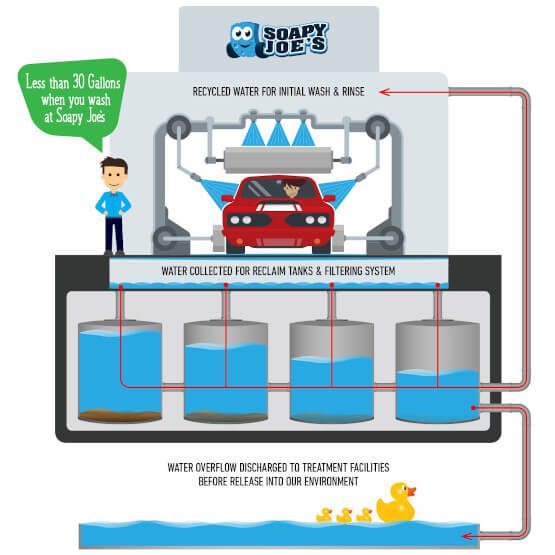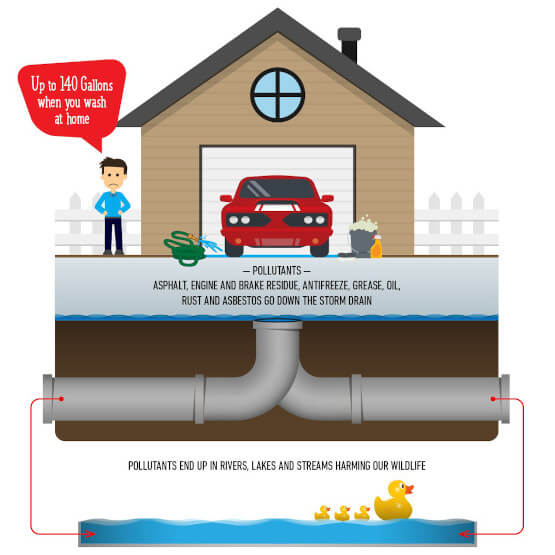Clean Car, Clear Conscience
Long before eco-friendliness was the massive movement it has become today, Soapy Joe’s was pioneering and investing in eco-friendly car wash technology to reduce our footprint. With us, you can enjoy that fresh-out-of-the-car-wash feeling knowing your car was washed responsibly and with respect for Earth’s most vital resource: water. A wash at Soapy Joe’s uses 80% less water than a DIY wash in your driveaway. Judging from the suds and sparkle, you would never know!
Washing at Soapy Joe’s vs. Washing at Home
Our focus is water efficiency and conservation. When you wash with us, you get a better quality wash AND use about 80%less water than you would use at home in your driveway.

Washing at Soapy Joe’s
Water use – We use a fraction of the water that home washers use. In fact, home washers can use up to 140 gallons of water while washing at Soapy Joe’s only uses approximately 30 gallons of city water per car. Average wash at Soapy Joe’s: 3-5 minutes!
Recycled water – We reclaim and filter all of our fresh water for re-use. This recycling process allows us to save about 20 gallons of fresh water for each wash.
Water treatment – Water that is not re-used is processed before being sent to sanitary sewer systems for further refinement and processing.
Safe chemicals – Our chemicals are pH balanced to a neutral state during our washing process and biodegradable. So you, your vehicle and the environment are not exposed to any harmful chemicals.
Central Collection – We have a central collection system for all the dirt and grime that accumulates on your car. We collect and re-direct it to facilities that can properly handle this non-hazardous waste that sometimes turns into potting soil or fertilizer.

Washing at Home
Wastes water – Studies have shown that hoses uses 14 gallons of water per minute. As many as 140 gallons of water could be used in a 10-minute home carwash, most of it wasted. Average wash at home: 30 minutes!
Pollutes storm drains – Washing at home sends all the corrosive and potentially toxic substances that are on your vehicle and on the street — asphalt, engine and brake residue, antifreeze, grease, oil, rust and asbestos — into the public storm drain system.
Clogs storm drains – Storm drains were designed to handle rainwater. When vehicles are washed at home, the dirt and grime is carried into storm drains, which can clog them from working most efficiently during our rainy season.
Harms wildlife – Even if bio-friendly soap (or no soap at all) is used, hosing off a car’s body and wheels at home dislodges pollutants that can end up in rivers, lakes and streams. In a 2006 study, it was shown that these chemicals can damage mucus membranes and gills in fish and wash away natural oils that help them absorb oxygen, ultimately leading to the loss of the fish.
